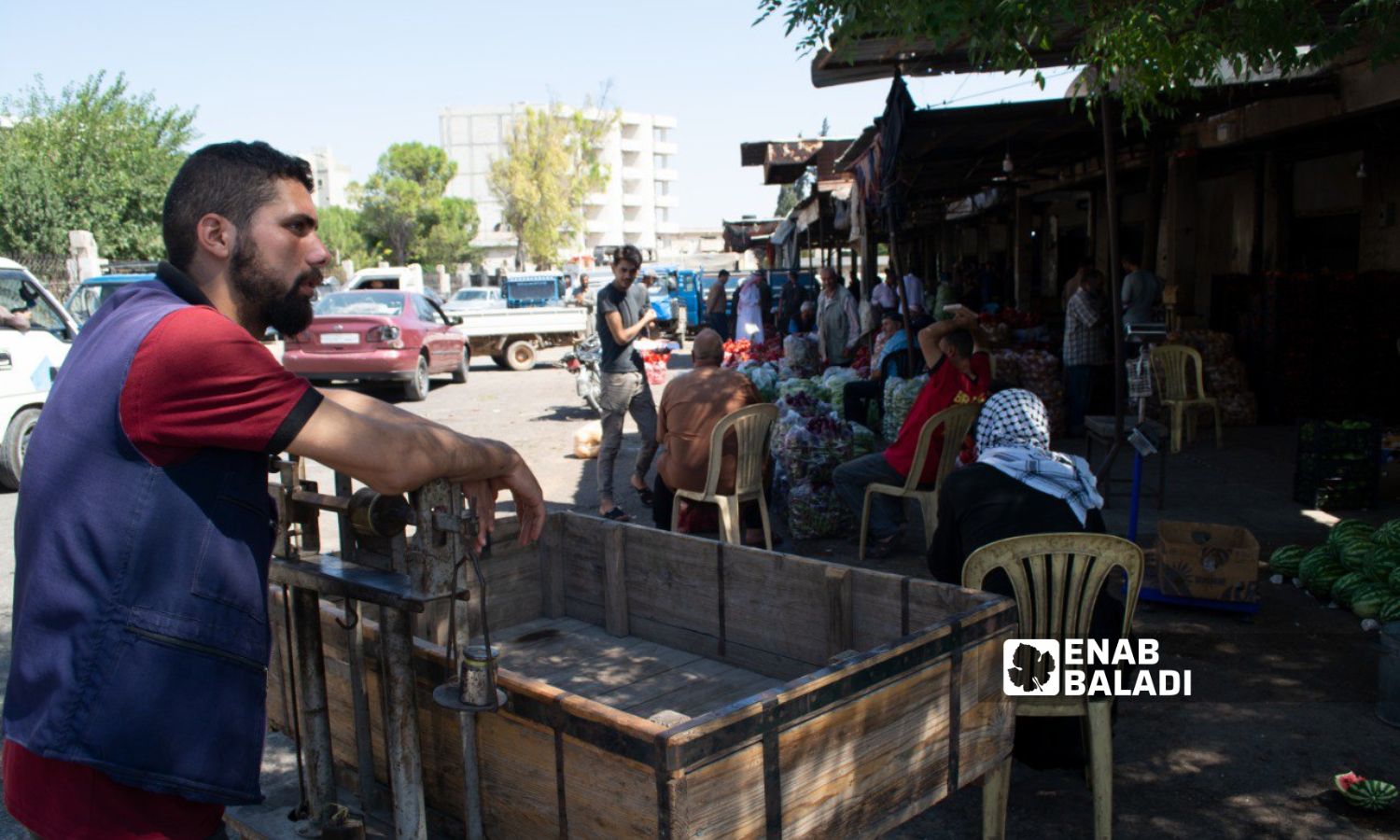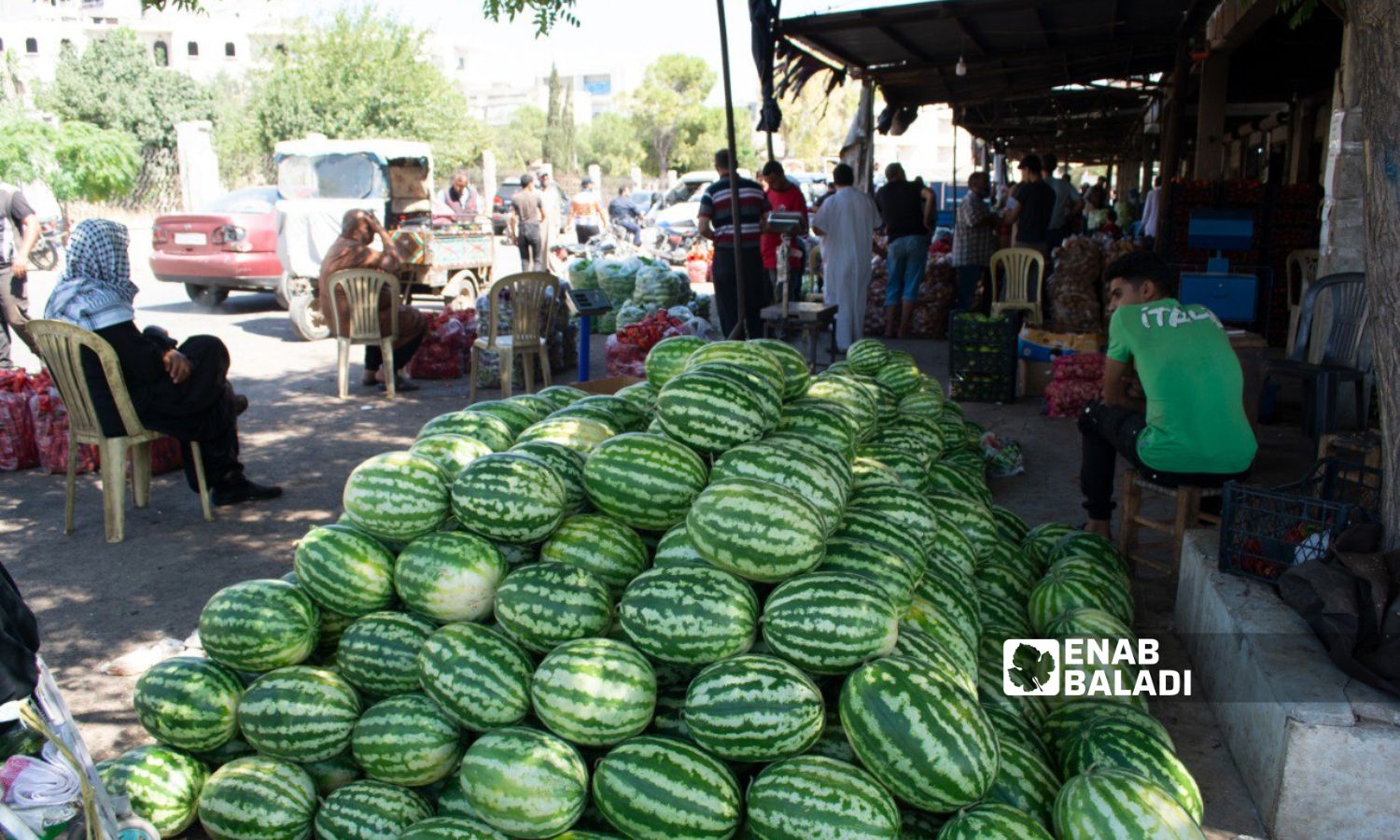



Enab Baladi – Jana al-Issa
The farmers and merchants in areas controlled by Hayat Tahrir al-Sham (HTS) in the northwestern Idlib region have been exposed to major losses since last July following a decision of the civil governing body, the Syrian Salvation Government (SSG), requiring dealing in the US dollar instead of the Turkish lira for buying and selling in the “Souk al-Hal,” the key wholesale vegetable market in Idlib.
The decision of Salvation’s Economy Ministry said all buying and selling deals should be in dollars. The ministry attributed the decision to the instability of the exchange rate of the Turkish lira, adding that “in the event of payment directly in the Turkish currency, the maximum limit will be calculated according to the approved exchange screen installed in the market, under penalty of accountability for violators.
Before the decision to adopt the dollar in the al-Hal market, the ministry had previously decided to sell medicines locally as well according to their price in dollars, coinciding with an unprecedented decline witnessed by the Turkish lira against foreign currencies.
The Turkish lira fell to unprecedented levels against the dollar, coinciding with the period of the presidential elections in Turkey.
During the last period, it exceeded 27 TL against $1 in northern Syria, an unprecedented value since the adoption of the new lira in Turkey in 2005.
The public relations official in the Ministry of Economy in the Salvation Government, Hamdo al-Jassim, said that the decision came after several sessions between the ministry and a number of farmers, merchants, and specialist economists to issue the circular requiring dealing in dollars in al-Hal markets, and to keep daily trading operations in the Turkish lira.
Al-Jassim explained to Enab Baladi that the decision does not include the obligation to price vegetables in retail markets in US dollars but as a result of complaints from farmers and merchants in the al-Hal (wholesale) markets due to dealing in the Turkish lira, specifically in forward sales between the farmers and the merchants, these groups were forced to deal in dollars.

Al-Hal main vegetable market in the northwestern city of Idlib – August 9, 2023 (Enab Baladi/Shams al-Din Matoun)
The Salvation Government’s decision was not well received by merchants in the al-Hal markets for many reasons, according to what Enab Baladi monitored.
Mohammad Qateea, a trader in the al-Hal market in Idlib, believes that it is difficult to implement the decision in daily transactions of local goods whose prices change with supply and demand and that their purchasing value is low, most of which are less than one dollar.
Qateea told Enab Baladi that if small coins (a few US cents) of the dollar were available, it might be possible to deal with them, but with this decision, merchants will be forced to buy vegetables from farmers in dollars and sell to customers in Turkish lira, and with every fluctuation of the lira, they will be threatened with loss.
Mustafa al-Zeer, a sales broker in the al-Hal market, told Enab Baladi that the decision can be applied to seasonal goods such as olives and potatoes, for example, because they have merchants who ship in large quantities, and payment is made after a period of perhaps up to a month, but in the case of selling to owners of vegetable shops and fruits in retail, dealing in Turkish lira is better in terms of the availability of coins, and because the goods are sold to the consumer in lira as well.
Residents of Idlib city have feared an increase in the prices of vegetables and fruits as a result of the decision, according to fluctuations in the exchange rate of the dollar against the Turkish lira.
Idlib-based Abdul-Majeed al-Mohammad refused to buy a bag of onions from one of the al-Hal market stalls after he found its price recorded in dollars, explaining that the seller would multiply the value of the commodity by the highest exchange rate to avoid loss, which would raise the price of the goods, and this would push the people to reduce their goods or dispense with them.
Mustafa al-Akoush, financial director and deputy administrative director at the General Monetary Management Corporation in Idlib, told Enab Baladi that all shops and professions in the region mainly deal in US dollars, even without an official decision. This trend has recently appeared clearly due to the fluctuation in the value of the Turkish lira.
Al-Akoush explained that any commodity that will be sold on credit will have its price fixed in dollars due to the changes occurring in the Turkish currency to ensure that merchants do not lose.
Because the issue relates only to pricing in dollars and not to cash dealing in it, al-Akoush considered that there is no objection related to the banking environment to this dealing.
Political economy expert Dr. Yahya al-Sayyed Omar told Enab Baladi that there are many countries that have relied on the dollar in daily transactions in addition to national currencies, such as Lebanon and Iraq, and the experience in both countries has been successful due to several reasons, including the presence of stable income from the dollar.
Al-Sayyed Omar explained that Iraq has oil revenues estimated at billions of dollars, and Lebanon was dependent on revenues from tourism, banking services, and remittances from expatriates, indicating that the success of any experiment, in general, is linked to the presence of several factors.
Regarding the decision to price vegetables in dollars in Idlib, the expert believes that the decision is good in theory, as it actually protects the farmer and consumer from losses resulting from fluctuations in the value of the lira. It also limits unjustified profits made by the exchange sector and reflects stability in the market.
But from a practical standpoint, the decision is ineffective for several reasons, the first of which is that the banking system in the region is modest and simple and does not support the freedom to exchange currencies, especially the dollar.
Daily exchange requires small denominations of the dollar, such as parts of the dollar, dollar bills, and other small monetary denominations. This is not available, as the majority of existing denominations are $100 and $50, according to al-Sayyed Omar.
The expert stressed that the total amount of dollars in the region does not support its imposition as a daily trading currency, as it is not sufficient for the minimum.
According to current data, the transfer of the decision to other sectors is unlikely, as it is expected to remain in the al-Hal market, and even at this level, the decision will witness lax implementation due to the lack of sufficient elements for its continued adoption, said al-Sayyed Omar.
The Salvation and Syrian Interim governments, operating in northern Syria, adopted the Turkish lira as a currency for trading in June 2020, as it is more stable than the Syrian pound, in addition to the circulation of the US dollar in foreign commercial transactions.
The replacement of the Turkish currency with the Syrian one in northern Syria came after the exchange rate reached 3,500 SYP for $1 in June 2020, amid demands from Syrians that the replacement be a temporary solution until a political solution is reached.
if you think the article contain wrong information or you have additional details Send Correction